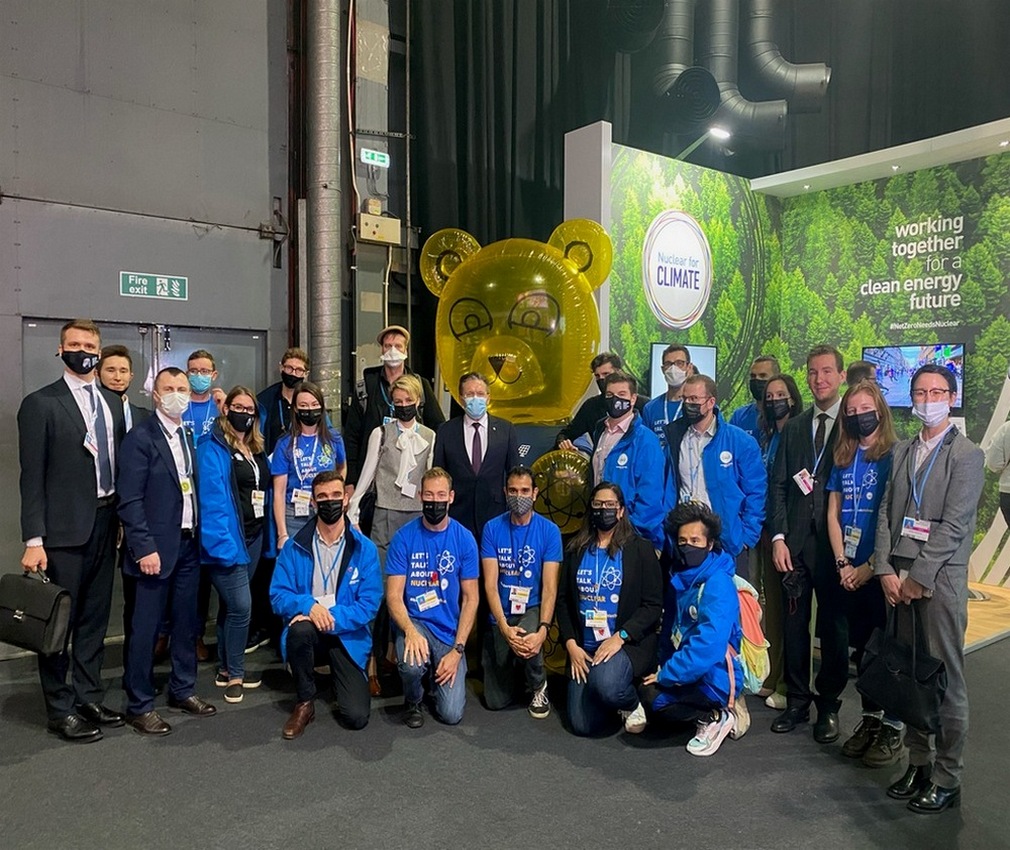12 November 2021 – ROSATOM took part in the 26th UN Climate Change Conference of the Parties (COP26), held in Glasgow; the event ended on 12 November 2021. The large international conference brought together about 25,000 people, including heads of state and heads of government from more than 120 countries.


Nuclear power occupied an important place on the conference’s agenda for the first time in the event’s history, with a notable number of sessions on the role of the nuclear energy industry in combating climate change. Session participants repeatedly and clearly expressed their assessment that the nuclear industry offers sustainable, safe, and low-carbon technologies that make a significant contribution to achieving both the UN’s sustainable development goals and global carbon neutrality goals.
Speaking at a November 11 session dedicated to “Low-carbon Development: Russia’s Role and Approaches,” ROSATOM Director General Alexey Likhachev summed up the results of the conference and thanked ROSATOM’s foreign partners and international organisations “for demonstrating a coordinated position at COP26,” noting that it was now “possible to divide the history of the world nuclear energy into before COP26 and after COP26” in light of the affirmative conclusions reached by the majority of participants. Likhachev expressed his conviction that the question of whether nuclear power should be included in a carbon-free global energy balance post-COP26 had an obvious answer: “Yes, it should.”
“It is an indisputable fact that the nuclear power industry has zero direct CO2 emissions and that the total greenhouse gas emissions throughout the entire lifecycle of a nuclear project are minimal and comparable to those of wind farms. Moreover, according to the latest studies, nuclear power plants have the lowest CO2 emissions of all types of clean generation. According to the most conservative estimates, the potential contribution of nuclear power plants to preventing greenhouse gas emissions is, on a global scale, comparable to the absorption capacity of all the forests on the planet,” said Alexey Likhachev.
The Pavilion of the Russian Federation devoted an entire day, November 8, to nuclear power. Designated “Clean Nuclear Energy Day,” the event saw representatives of the largest companies and organisations in the field of nuclear energy, amongst them ROSATOM, discussing a number of key issues, including how to achieve carbon neutrality and the role of nuclear energy in attaining this goal, the role of human capital in achieving global climate goals, and how non-energy nuclear solutions contribute to sustainable development.
Young people – those who will face the challenges of the future energy transition and climate conservation – were the most active participants in COP26. On November 5, young professionals shared their vision of how to achieve global climate goals as part of the Day of Youth and Climate Education programme.
Participants of the “Net Zero World: The Youth Perspective Today & the Future” panel discussion shared their views on how younger generations can help find solutions to challenges to achieving a carbon-free future. In his address to panelists, IAEA Director General Rafael Grossi noted that, in addition to making a significant contribution to the fight against climate change, the nuclear energy industry offers young people interesting, well-paid jobs and opportunities for development.
Another important ROSATOM-organised session was that titled “Youth for Nuclear: Reconsidering the Sustainable Energy Challenge,” which was opened with a speech by ROSATOM’s Deputy Director General for Human Resources Tatyana Terentyeva.
The session united nuclear experts of ROSATOM, the IAEA, and the OECD NEA, on the one hand, and young industry professionals from Generation Atomic, Idaho National Laboratory, Nuclear Innovation Alliance, Cavendish Nuclear, and Women in Nuclear Young Generation, amongst other organisations, on the other. Session participants talked about how they started their careers in the nuclear industry and discussed the challenges facing the industry’s processionals, and the cooperation of young nuclear scientists across the world on the climate agenda and achieving 2050 goals, where nuclear energy plays an undeniably important key role. ROSATOM representatives, including Rosatom Corporate Academy Deputy Director General Gulnara Bikkulova, Rosatom Corporate Academy project manager Alexander Kormishin, and Rosatom Central Europe representative Oleg Spoyalov, shared their professional stories.
Polina Lion, ROSATOM Chief Sustainability Officer, took part in sessions on the global climate agenda, including the development of green finance tools for sustainable development. Commenting on the results of COP26, Lion said: “Nuclear power had a loud voice at COP26. Nuclear energy was spoken about as an important tool for achieving global carbon neutrality not only by representatives from Russia’s nuclear power industry, but also our colleagues from international organisations. This attention is deserved. Just before COP26, the UNECE published the results of a study showing that nuclear generation has the lowest lifespan emissions, even lower than those of wind energy. We can say that the result of COP26 is that nuclear energy has carved out a more deserved place for itself – a right to participate in the climate conversation.”
